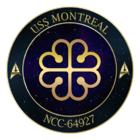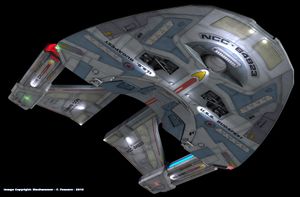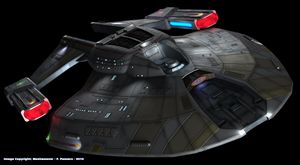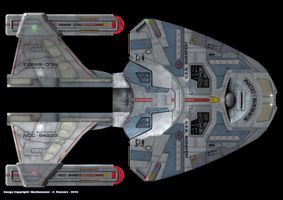Montreal Technical Overview
| USS Montreal | ||
|---|---|---|
 LOST | ||
| ||
General
- Category: Medium Cruiser
- Length: 364.77 meters
- Beam: 225.61 meters
- Height: 52.48 meters
- Mass: 622,000 metric tons
Personnel
- Crew Complement:
- Officers: 45
- Crew: 145
- Evacuation Limit: 500
Speed
- Cruising: Warp 6
- Maximum: Warp 9.7 for 12 hours
Armament
- Phasers: Six type-10 phaser arrays
- Photon Torpedoes: Two photon torpedo launchers
Atmospheric Entry
The USS Montreal is capable of atmospheric entry and egress with equipment worked into the physical design of the starship. Each Norway class class vessel is equipped with anti-gravity generators as well as impulse and RCS lifters strategically placed at the mass and stress points on the bottom portion of the main saucer section as well as balancing thrusters on the aft-bottom of the catamarans.
It is standard procedure to lower the landing gear at approximately 2500m above the Landing Zone surface, regardless of Landing Zone altitude. This minimizes the drag on the vessel. Once prepared for landing, Aft impulse engines are shut down and four vents on the ventral hull are opened.
These vents cover the ventral impulse thrust plates. Impulse engines in miniature, the thrust plates serve only to provide lift to the vessel as the anti-gravity generators effectively reduce its weight. The RCS thrusters provide final maneuvering power.
Once on the ground, crew or equipment can be transported to the surface from the vessel. There are a few ways to exit the ship. One is a large cargo hanger with a drop ramp decking inside that extends the ground. Another is a hold that houses a few ground vehicles like that of the Argo. The last way is an extending turbolift that is in all three landing struts, that opens to a small tactical and equipment locker in the feet of the struts and then out on the ground from a hatchway.
This feature makes the Norway class class a great option as a temporary planetary lab or mobile hospital.











